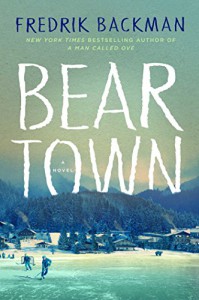
I read the first half of "Beartown" in about three days back in May, some seven months ago now. I was delighted. Here's what I said about it after the first day:
Beartown” is the latest book from Fredrik Backman ( “A Man Called Ove” and “My Grandmother Asked Me To Tell You She’s Sorry”).
It’s about a remote, slowly dying, small town in the middle of the woods where the success of the Junior Hockey Team is the last hope for the town to grow rather than continue its slow decline
I’ve barely started the book and it's already holding my imagination hostage. The language is simple and undramatic yet it gets to the heart of the things that shapes lives.
Here’s how it starts:
“Late one evening, towards the end of March, a teenager picked up a double-barrelled shotgun, walked into the forest, put the gun to someone else’s forehead and pulled the trigger. This is the story of how we got there”.
As I read more, I was carried along by the rhythm of the sparse language, which beat into me, like the smack of a puck against a fence, how much a hockey team and a hockey game can mean to a small, failing town in need of hope and pride. It drew me into the lives of people I could see as clearly as if I'd lived with them for years and let me see the world through their eyes
And with each page, as we journeyed towards that shotgun in the woods, my sense of dread grew.
Then I reached the rape.
I saw the damage it did. I imagined the damage it would do. I understood how the ordinary, everyday nature of the act intensified its evil at the same time that it made it credible. This is how life is. I know that. But I couldn't bring myself to read more of it.
I set it aside for a while. I didn't want to abandon something so well written and so true. I was sure I'd pick it up again and savour it.
Today, I tried, not for the first time, to go back to it.
I can't, or, more honestly, I won't.
It's painful to see the world that clearly and then focus on how we do each other harm and how the harm is amplified by poverty, desperation, and a culture where the right of the powerful to do wrong is accepted with sad resignation rather than challenged with righteous anger.
I'll move on to Backman's next book and leave this one closed.










